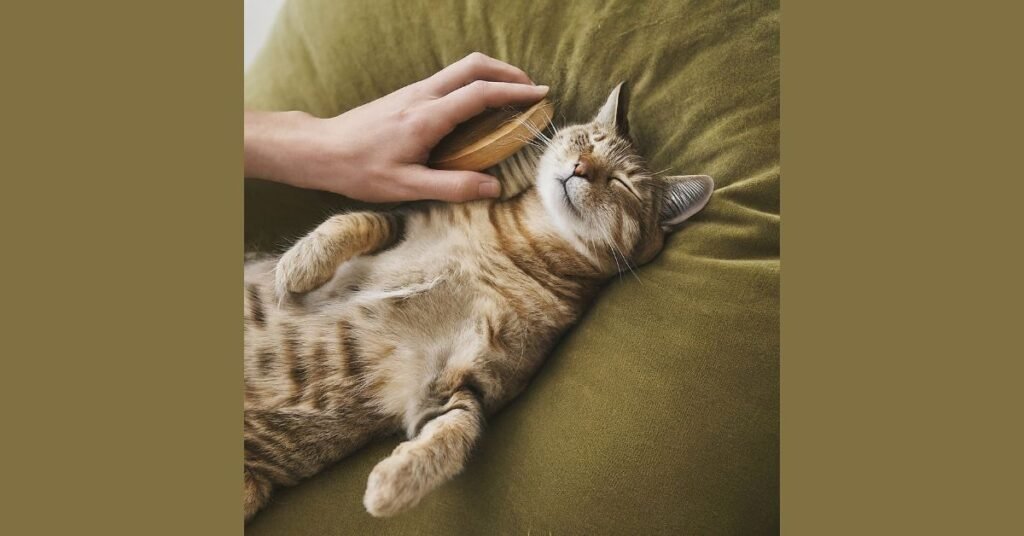Cats are known for their meticulous grooming habits. They spend a significant portion of their day meticulously licking and cleaning their fur. While this may seem like a purely aesthetic endeavor, regular grooming is actually essential for your feline friend’s overall health and well-being. Brushing your cat not only keeps their coat shiny and healthy, but it can also address allergies, reduce anxiety, and even prevent hairballs.
The Power of Brushing: Benefits Beyond Beauty
Going beyond the surface-level benefits of a sleek and tangle-free coat, cat grooming offers a multitude of advantages for your furry companion. Here’s a closer look at how regular brushing can positively impact your cat’s health:
- Reduced Allergens: Cats, like humans, can suffer from allergies. Common allergens like pollen, dust mites, and dander can get trapped in their fur. Regular brushing helps remove these allergens, minimizing the risk of allergic reactions in both you and your cat.
- Improved Skin and Coat Health: Brushing stimulates blood circulation, promoting healthier skin and a shinier coat. It also helps distribute natural oils throughout the fur, keeping it supple and preventing dryness. Additionally, brushing removes dead skin cells that can contribute to skin irritation and discomfort for your cat.
- Minimized Hairballs: Cats naturally groom themselves by licking their fur. This can lead to the ingestion of loose hair, which can then accumulate in their stomachs and form hairballs. Brushing helps remove loose hair before it gets swallowed, significantly reducing the frequency and discomfort of hairballs.
- Early Detection of Health Issues: During brushing sessions, you can closely examine your cat’s skin and fur for any abnormalities like lumps, bumps, or signs of irritation. Early detection of these issues allows you to seek veterinary attention promptly, potentially preventing more serious health problems.
- Stress Reduction and Bonding: Brushing can be a calming and relaxing experience for your cat. The gentle strokes can provide a sense of security and promote a sense of well-being. This can be particularly beneficial for anxious cats, as grooming can offer a comforting routine and strengthen the bond between you and your feline friend.
Brushing Tips for Happy Cats
Now that you understand the numerous benefits of cat grooming, let’s explore some tips to ensure a positive and successful brushing experience for both you and your cat:
- Start Early: Introduce your cat to brushing from a young age. This will help them become accustomed to the routine and make it easier for you to brush them as they grow older.
- Choose the Right Brush: The best brush for your cat depends on their fur type. Short-haired cats benefit from brushes with short bristles, while long-haired cats might require a combination of brushes, including a slicker brush and a de-matting comb.
- Keep it Short and Sweet: Start with short brushing sessions (a few minutes) and gradually increase the duration as your cat becomes more comfortable.
- Focus on Sensitive Areas: Be gentle around sensitive areas like the face, paws, and belly.
- Positive Reinforcement: Reward your cat with treats or praise during and after brushing sessions to create a positive association with the experience.
Addressing Common Concerns: FAQs About Cat Grooming
- How often should I brush my cat? The frequency of brushing depends on your cat’s fur length. Short-haired cats typically require brushing a few times a week, while long-haired cats might need daily brushing to prevent matting.
- Does brushing hurt my cat? Brushing should be a gentle and relaxing experience for your cat. If your cat seems distressed or in pain during brushing, re-evaluate your technique or consult with your veterinarian.
- What if my cat hates being brushed? Introduce brushing gradually with positive reinforcement. If your cat remains resistant, consider seeking professional grooming services for long-haired breeds.
- My cat sheds a lot. Will brushing help? Brushing removes loose hair before it sheds, significantly minimizing the amount of hair floating around your home.
- Is there anything else I can do to keep my cat healthy? In addition to regular brushing, a healthy diet, regular vet checkups, and providing opportunities for exercise and play are crucial for your cat’s overall well-being.
Conclusion:
By incorporating regular brushing into your cat’s routine, you’re not just enhancing their appearance; you’re contributing significantly to their physical and mental well-being. From reducing allergens and promoting healthy skin to minimizing hairballs and fostering a stronger bond, cat grooming is an investment in your feline friend’s happiness and health. So, grab your brush, cuddle up with your cat, and enjoy the purrs of contentment that come with a good grooming session!

